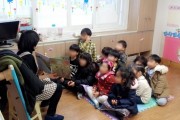Despite public awareness of the link between pressure in the office and South Korea’s extremely low fertility rate, (just 1.24 babies per woman), news reports show that there is still hostility toward young mothers taking maternity leave. In this investigative report, young parents shared their stories of struggling to provide childcare and keep a job.
The stories provoked despair from online readers, who responded with their own memories of the challenges of raising a child and keeping a career in South Korea. Most notably, they are made to feel intense guilt whenever they have to take a vacation day and their boss just pushes their work onto coworkers.
Article From Money Today:
“Can I take a day off to take care of my child?” vs. “We all have children. Don’t be demanding.”
[Money Today Editor Note] South Korea has an average fertility rate of 1.3 children per woman, a reflection of how hard raising children is in this nation. There are countless emotional stories of working mothers struggling to work tooth and nail for a living while taking care of babies who need constant parental attention. We, Money Today, seek to explore ways to make working mothers and children happy together.

A working mother struggle to juggle work and childcare while her boss in the background say,”Cheer up, and Let’s do some overtime.” Below the picture is words reading, “Do I want too much when I try to keep both my work and child?”
Working Mom A, a 35-year-old fashion designer, has a son who just passed his first birthday. A is typical of career women who aspires to successfully provide childcare and maintain a career. While her parents take care of her son, she has many responsibilities to oversee.
The most common event that disrupts her schedule is a day when her child gets sick. Scheduling vaccination doctor visits can also create difficulties. In such situation, A hurries to get her work finished, skipping lunch in order to leave work early. Fortunately, her boss is quite understanding about these matters, but she has to be aware of the feelings of her colleagues.
A said, “When an employee gives birth and has to take off work, the company doesn’t hire any temporary help, they just shift that employee’s workload to their coworkers. This makes the woman take account for the feeling of colleagues and whether they will resent the extra workload.
A report on South Korea’s working mothers released in 2010 by the Samsung Economic Research Institute found that maternity leave programs and the office atmosphere at firms was the number one reason that makes women feel uncomfortable having children. 53.7 percent of survey respondents said the maternity programs were an issue of concern. 29.2% who said they were worried about the feelings of bosses and coworker, 27.4% said they were concerned about the how to look after their children. and 18.4% cited the attitudes of their husband as a factor in their decision to not become pregnant.
The report also highlights the practical difficulties facing women who use maternity leave for delivery and childcare. The survey in the report shows that the biggest reason women find it hard to use maternity leave firms offer is resistance from their boss.
However, childcare is not any easier for working fathers than it is for their spouse. Even when working men are willing to share the childcare burden with the mother, there are still many social obstacles to them doing so.
B, the husband of working mother A, works for a architecture firm in Seoul. B has keenly felt time and again how difficult child-raising is in South Korea. He does not have the slightest desire to have another baby.
B cites corporate culture as the primary reason for making child-rearing difficult in the nation. His son needs constant parental attention to get his vaccinations and medical checkups. One day, B needed to leave work earlier than usual to take his son to a doctor’s appointment, A couldn’t afford to take the time off from her job. Nor could B’s mother, the child’s grandmother, drive the long distance to the hospital with B’s son.
Mustering his courage, B spoke of his willingness to take one of his yearly paid holidays to his boss, who retorted, “Don’t make waves, man.” B said, “My firm has little regard for employees who have infants. He complained of the difficulties related to childcare, saying, ‘Hey, you need to work harder now that you have a child. What are you talking about? Every one has a child of their own. Don’t be so demanding!’ he made childcare into such a burdensome task.”
“The real problem is the corporate culture and high intensity workloads, not a lack of the awareness about the demands of childcare. Heavy workloads for an employee shift to his coworkers who are already swamped with their own share,” B noted.
He continued to complain, saying, “My working hours already far surpasses the legally allowable limit, but no job is very secure these days, so few people protest.”
Comments from Naver:
zwog****:
The government only talks about encouraging women to have children, but they don’t provide any support for such families. In an equal world for men and women, men should also be entitled to paternity leave.
hew9****:
I think I’d better leave this country. Family is one of the most important things in life, but this nation makes childcare such a challenge!
kang****:
I am a working mother in my late twenties, with a four-year-old daughter and a two-year-old son. But I know how my workplace feels about maternity leave, so I have never used it. I think the public awareness of working mothers needs to improve. For their part, fathers also need to share the housework. Isn’t it unfair that women do housework after returning from work while men just watch TV without lifting a finger?
star****:
It should be easier to use maternity leave. Worrying about childcare make it hard for me to concentrate on my work, which reduces work productivity. By making it hard for people to use maternity leave regardless of what the law says, companies reduce their employees’ enthusiasm for work. The whole reason why people come to work is to take care of their family.
chec****:
I feel helpless and defeated when I think of having a baby. This is the reality in South Korea.
them****:
The difficulty of juggling work and family life makes some people quit work and become full-time housewives. After all, women are the butt of criticism: When they stay single, they are under pressure for marriage; When they get married but have yet to have a baby, everyone tells them to get pregnant; When they have babies, everyone says that women put a burden on the shoulders of their husband to bring home money; When they get back to work after giving birth, they face a hell where husbands don’t lift a finger in doing housework and women are the ones who have to take off work whenever their child gets sick; If something bad happens to the children, people scold the woman, saying, “Does your career matter more than your child?” What a pitiful life for women.
iris****:
This is where the Ministry of Gender and Family has to step in. The ministry does not exist for rating some K-pop songs as X-rated. Why does the ministry stay silent about this problem?
nrwi****:
I agree that office life is too intense. I have no idea why meetings have to start after normal quitting time. If we work hard all day but can’t finish our work, it should become tomorrow’s work, not tonight’s. We need to change corporate culture to stop working overtime and being forced to attend after-work parties.
xhrm****:
Working overtime has become the norm in South Korea, which is the only second to Mexico in the length of working hours. Can we hope for any change in this nation? Koreans working in foreign countries said that they get complimented when they just work as much as they are contracted to, but in South Korea working 100 times harder doesn’t even get any recognition.
따봉:
You know what? American major league players can take leave when something comes up with their family and fans and franchise owners aren’t critical of it. Even star players get the same treatment. But in South Korea, letting an employee take maternity leave is a big deal, even though the absence of an employee is no big deal for a corporation. That makes me feel bitter.
Comments from Daum:
HYNNIKU:
This is no country for having babies.
오늘도^^ 좋은 생각:
I have a 7-month-old baby. I worry about how my wife will get along well back in her workplace next year. Whenever she has a cold, our whole family gets concerned about her. Just thinking of her getting sick after getting back to work is a headache for me.
Alou:
After I have a baby, I won’t have any life of my own.
아리송:
Advanced nations attach importance to the family and childcare. But South Korea has childcare at the end of a long to-do list. There is no bright future for the nation unless things change.
긍정의 힘:
We are a double-paycheck couple with a child. We were able to make it through the period right after we had our child…but then we had nowhere to send him between when he finished nursery school in February and when he entered elementary school in March.. we were able to make it by sending him to an all-day kindergarten, whew, what a time.
내일도 맑음:
There are always things to be taken care of for children, whether they are infants or elementary school age. When our child is in a summer or a winter break, I am concerned that he is left alone at home and make sure to fix a lunch for him early so that he can have it at lunchtime. He often calls me to ask when I will be coming home, but frequent calls to my workplace make me nervous because of how it might make my coworkers or my boss feel. Once he becomes a fifth-or sixth grader he will no longer call me at work because I will be replaced with his good friends-a smartphone and the TV. To get him off his smartphone and watching television, I send him to after school classes, but despite the cost I don’t see his grades improving. In a nutshell, we sleep together under one roof but have no time to talk to each other. No one in my family lives as a family member in the true sense of the word.









